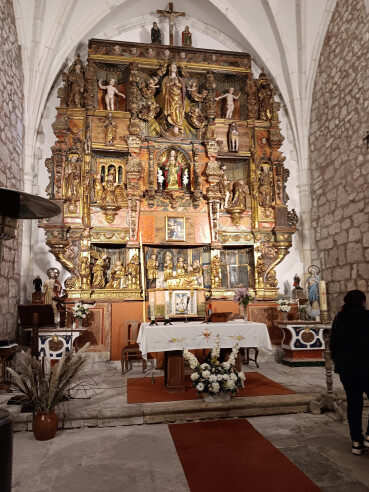The Frenchies

For nine years, they’ve been walking the Camino, one week per year. They all come from Paris and they all belong to the same Catholic parish. They bring a priest with them and have various daily prayer times (for instance, Compline) as well as a daily mass. Each year they pick up at the spot they ended the previous year. They started in Le Puy, the origin of one of the traditional Caminos that begin in France. (From Le Puy to Santiago de Compostela in Spain is 1600 km.) This year they picked up in Rioja, Spain, and finished at a town on the edge of the Meseta in Castilla y León.
It was in San Juan de Ortega that I first saw them. We were all staying in an albergue founded by San Juan who, in the 12th century, saw the need for pilgrims having protection in that little-populated area from violence and harsh weather. To meet that need Juan founded an Augustinian monastery, which somehow still stands and still harbors pilgrims. (The monks, alas, are all gone.) We were waiting for dinner that evening, soaking up welcome warmth from the sun, and I was looking for people to sit with who spoke English. Thus on that occasion I stayed away from them.
The next day, when I got to the albergue I intended to stay at, there they were. This was a much smaller space, adjacent to the village’s antique church. I always try to enter churches, even when they are expected to be closed, so about 5:30 I walked to this one—and the doors were open! Inside a couple of elderly Spanish ladies were busily and noisily lighting candles and so forth, so I sat down. Eventually a man appeared and announced to them he was the priest. He was, of course, one of the French group. And shortly all 15 were there, and a few of us curious outsiders, for an unannounced mass in a foreign language—French. They sang beautifully and spontaneously. They had a conversation about the Gospel in place of a sermon; I couldn’t follow that but I did hear the proclamation Je suis le pain de vie (“I am the bread of life”). At communion I went up for a blessing; Père Philippe said (in English) “Jesus is always with you” as he signed my forehead.
From that day, it seemed I kept running into them—at mass in the next city, at the albergue in the next, and at mass on their final evening. I learned of their life, the life of ordinary but serious Christians in their place. I learned of the hostility toward the church in some parts of Paris—broken windows and so on—although their neighborhood was “not so bad.” This came up as one of those strange twists that translation causes. I had spoken of the need for evangelism in our age, which is marked by increasing opposition to Christianity. I meant things like the ideas that are simply presupposed (for instance, that we have the right to choose the time and means of our own death). But they heard it as particular violent actions. Both, of course, are happening.
One man told me that he had earlier in his life fallen away from the faith. But when he and his wife put their children in a Catholic school (“a good school”) he started seeing the good in the church, and it brought back his faith. His summary: I came back to faith through my children’s education. He reads the Bible daily. Like all the others in this group, he has that little Catholic “Magnificat” book that comes out seasonally and has the prayers and readings for every day. He prays for his children, who have fallen away from the church; I said, “Maybe when they have children . . .”
They liked me and, as best they could understand, appreciated me as an Anglican priest. I liked them, wanted to know more of their stories, wanted our time together to continue.
But it ended this morning (as I write this): they departed for a train towards home. We have promised to “pray for and with” each other. This is a particularly poignant separation for me. On the Camino, others have talked with me about these separations; if we think about it, we realize it is happening every day. You share a bit of your heart so easily on the Camino. You get access to a bit of the heart of someone else. And then you part, and you might never see each other again in this life.
Yet, as I thought as I left these dear French folk, even if I never see them again, we have the hope of seeing each other in a future life that will never end.
—
Out & About: As I wrote earlier: Once I emerge from the Camino I am to preach on May 26, Trinity Sunday, at St. Matthew’s Cathedral in Dallas. And the next Good Books & Good Talk seminar will be at St. Matthew’s on June 2, on Klara and the Sun by Kazuo Ishiguro.

